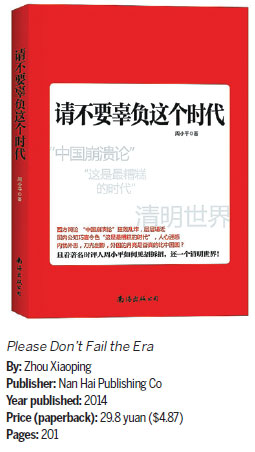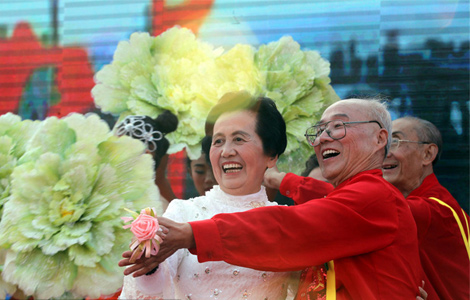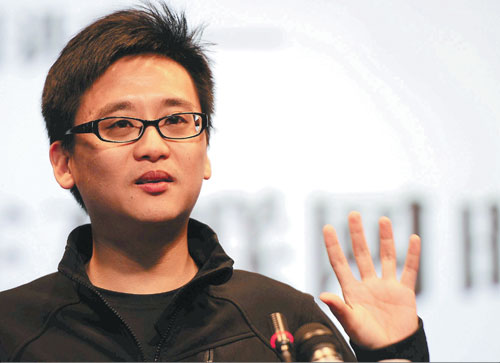Rallying cry
Updated: 2014-10-29 07:12
By Xing Yi(China Daily)
|
||||||||
A 33-year-old blogger has become a proud voice reflecting the dreams of a new generation of Chinese, attracting fans and critics along the way, Xing Yi reports.
Zhou Xiaoping, a 33-year-old blogger, became a hot figure after attending a recent forum on art and literature with other 70 well-established writers and artists, which was chaired by President Xi Jinping.
When talking about Internet literature during the forum, Xi specifically mentioned Zhou and another Web writer, Hua Qianfang. When shaking hands with them, Xi encouraged them to "continue to write works that carry positive energy".
However, Zhou's public expression of patriotism has attracted not only acclaim but also verbal abuse and sarcasm. Some netizens praise Zhou for expressing their common feelings bravely and straightforwardly, while others criticize him for "flattering" the government.
"Putting label on a person to attack him was a typical practice during the 'cultural revolution' (1966-76)," says Zhou, who seems to be rather dismissive of naysayers but stays cool with criticisms. "We could debate in a reasonable way."
Born in Rong county of Sichuan province in Southwest China, Zhou started to post articles online in 2006. He posts most of his commentaries on his blog, Comrade Zhou Xiaoping. Zhou writes about his love of China, urging young countrymen to be patriotic. He also posts analyses on issues related to national strategy, such as the importance of Internet security and the nation's soft power.
Most of his recent blog posts reflect his opinion on the country's development, expounding the government's achievements in economy and poverty alleviation, and his love of the country.
Zhou says that he was greatly influenced by the West when he was young and wrote a lot of "silly" articles that sharply criticized China and highly praised Western countries.
"I was once affected by the negative opinions against our country on the Internet and accepted some biased values," says Zhou.
"But as I read more books and learned to think independently, I started to realize that no other country is more unjustly accused than today's China."
Zhou shares the story of the transformation of his views in one of his most-read posts, Please Don't Fail the Era, the subtitle of which writes: "If you also have once cursed the country, dare to come in and read this."
In the article, Zhou counters many misrepresentations about China and asks his fellow Chinese not to overgeneralize that the whole country is corrupted just because of some of the shortcomings exaggerated by the media and the Internet.
In another popular post, Broken Dreams in the USA, Zhou breaks the illusion of the perfect life of US that many Chinese hold in their minds, and lists many misconceptions about the US, including the cheap consumer goods and real estate which are widely circulated in Chinese cyberspace.
However, Fang Zhouzi, a well-known science critic, has pointed out 13 mistakes in Zhou's article, such as inaccuracies about low wages and high cost of living in the US.
"I have read some similar fault-picking articles, but as far as I know, these kind of articles are heavily criticized on Twitter among Chinese students abroad," says Zhou. "Most of them agree that although there are some inaccurate data in my article, it reflects the reality of the US."
Despite doubts and criticisms of his writing, Zhou has no lack of supporters.
Zhou's blog has recorded more than 10 million views and his account on Sina Weibo, the popular Chinese micro-blog platform, has more than 500,000 followers.
The collection of his blog articles with the same title, Please Don't Fail the Era, has been published earlier this month and has already sold 30,000 copies.
Zhang Yiwu, a professor of Chinese literature at Peking University, writes commentary about why Zhou has become popular.
"Although Zhou's articles have defects and sometimes seem immature, they show us the dream and ambition of Chinese youth," says Zhang. "The most important is his identification with the country, which echoes with many of his contemporaries."
"He has found the common feeling and choice of China's silent majority."
Contact the writer at xingyi@chinadaily.com.cn
|
Chinese blogger Zhou Xiaoping gave a lecture earlier this year at the China University of Petroleum about how to think independently in the Internet era. Yu Fangping / China Daily |

(China Daily 10/29/2014 page22)

 China factory well suited to help in Ebola fight
China factory well suited to help in Ebola fight
 'World Heritage in China' photo exhibition held in Belgrade
'World Heritage in China' photo exhibition held in Belgrade
 6th World Traditional Wushu Championships kicks off in Anhui
6th World Traditional Wushu Championships kicks off in Anhui
 A 'floating city' in East China
A 'floating city' in East China
 Couples mark golden wedding anniversary in Jiangsu
Couples mark golden wedding anniversary in Jiangsu
 Giant chocolate King-Kong ready to storm the stage
Giant chocolate King-Kong ready to storm the stage
 ZTE to be NY Knicks' smartphone sponsor
ZTE to be NY Knicks' smartphone sponsor
 China's economy in 'transition': expert
China's economy in 'transition': expert
Most Viewed
Editor's Picks

|

|

|

|

|

|
Today's Top News
Two Chinese universities listed in top-100 ranking
Ontario seeks business in China
China factory well suited to help in Ebola fight
Suning sets the date: 11.11 debut for US store
Chinese rail firms in mix for California
ZTE to be NY Knicks' smartphone sponsor
Man guilty of murder in attack on Chinese students
Canadian PM cancels trip to Beijing for APEC meeting
US Weekly

|

|








